Nine of nature’s miracles
Alleviate combines nine of nature’s miracles in a carefully balanced formulation of all natural and organic ingredients that work fast to relieve your pain and discomfort, and shrink and heal the hemorrhoids. Independently, each of these ingredients is just one of nature’s hidden miracles, and together they will work to alleviate your suffering.
Alleviate’s Active Miracle Ingredients
1. Shea Nut Butter (butyrospermum parkii)
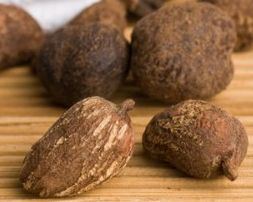
Each summer, the African Shea tree bears a fruit the size of a plum, which contains a nut. Shea butter is the fat extracted from the seed that is removed from the shea nut. The pits of the pulpy fruit are picked by hand, allowed to sun dry, and roasted in order to dehydrate the inner nut… Pure unrefined virgin shea butter is hand crushed, undergoes no chemical processing and is free from bleaching agents, preservatives, and additives. It is still harvested and prepared using the same methods practiced for thousands of years.
Shea Butter is a great emollient and easily penetrates the skin to moisturize. Virgin Shea Butter is naturally rich in Vitamin A, E and F, as well as phytosterols, triterpenes, fatty esters and phenolic acids. Vitamins A and E are important in helping to repair skin damage; phytosterols, and triterpenes aid in skin allergies; phenolic acids are good for cellular protection and repair. Vitamin F contains essential fatty acids, and helps protect and revitalize damaged skin.
It is quickly absorbed without leaving greasy residue and penetrates deep into the epidermal layer of the skin to help restore elasticity and prevent the cellular breakdown that leads to dry, cracking skin.
Shea Butter is known to promote skin renewal, increase circulation and accelerate the healing of wounds and may improve scars due to its anti-inflammatory properties In its pure virgin form, Shea butter is used to heal eczema, burns, rashes, severely dry skin, and to lessen the irritation of psoriasis.
2. Coconut (cocos nucifera)
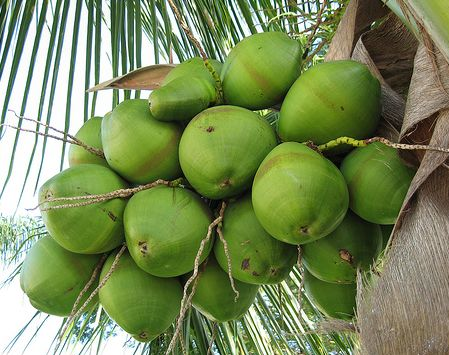
Coconut oil is an edible oil extracted from the inner kernel of matured coconuts. Oil from the coconut acts as an effective moisturizer on all types of skin. It is a remedy for preventing dryness and flaking of skin and is known to delays wrinkles, and sagging of skin due to age. Coconut oil also helps in treating various skin problems including psoriasis, dermatitis, and eczema .
Coconut oil is an important ingredient of various body care products such as soaps, lotions, and creams used for skin care. Due to its antioxidant properties, Coconut oil also helps in preventing premature aging and degenerative diseases.
Particularly when applied on infections, it forms a chemical layer which protects the infected body part from external dust, air, fungi, bacteria and virus. Coconut oil is effective on bruises as it speeds up the healing process by repairing damaged tissues.
Most important, Coconut oil has actually been shown to kill bacteria, viruses and fungi while enhancing the body’s immune system. It relieves symptoms associated with irritable bowel syndrome and Crohn’s disease.
3. Cocoa (theobroma cacao)
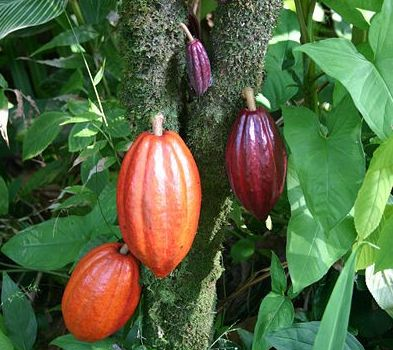
Cocoa butter, also called cacao butter, is the cream-coloured fat extracted from cacao seeds (cocoa beans). The natural cocoa beans are hung in bags in a warm environment to separate the cocoa powder from the butter. The powder is used for the making of chocolate, and the butter which drips away it is collected and used to add flavour, scent, and smoothness to chocolate, cosmetics, soaps, and a huge variety of topical lotions and creams.
It is one of the most stable, highly concentrated natural fats known, and because it melts at body temperature, it is readily absorbed into the skin and is a natural moisturizer.
Cocoa butter is often recommended for treatment of skin conditions such as eczema and dermatitis. When applied topically, it creates a barrier between sensitive skin and the environment and also helps retain moisture.
4. Cypress (cupressus sempervirens)
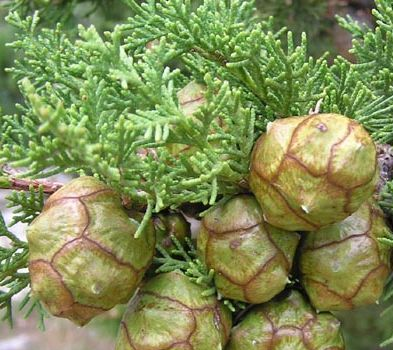
Cypress is a tall cone-shaped evergreen tree, with slender dark green branches, small flowers, and round brown-grey seed cones. Cypress oil is steam distilled from the needles and twigs of young branches, to obtain a woody, sweet-balsamic essence.
Cypress oil is considered non-toxic, non-irritant and non-sensitizing. The therapeutic properties of cypress oil are astringent, antiseptic, antispasmodic, deodorant, diuretic, haemostatic, hepatic, styptic, sudorific, and vasoconstrictor, among others.
Its astringent and vasoconstrictor qualities cause the skin to tighten and blood vessels to contract, which can be beneficial in case of bleeding.
Due to presence of camphene in Cypress essential oils, its antiseptic qualities make it a good application for external and internal wounds.
Cypress oil is also haemostatic and styptic. A haemostatic agent can stop blood flow from a wound by promoting clotting while the styptic quality will help to contract swollen blood vessels.
5. Peppermint (mentha x piperita L.)
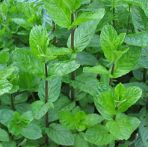
Peppermint is a perennial herb that grows up to 1 meter (3 feet) high and has slightly hairy serrated leaves with pinkish-mauve flowers arranged in a long conical shape.
Peppermint essential oil is extracted from the whole above ground plant just before flowering. The oil is extracted by steam distillation from the fresh or partly dried plant.
For the digestive system, peppermint oil is effective for a range of ailments, as it stimulates the gall bladder and the secretion of bile. It is used internally for colic, cramps, dyspepsia, spastic colon, flatulence and nausea and can relieve pain in cases of toothache, aching feet, rheumatism, neuralgia, muscular pains and painful periods.
Externally, peppermint is an antiseptic, antiviral, vasoconstrictive, and reduces inflammations and skin itching, while producing a cooling effect on burning irritated skin.
6. Jojoba (simmondsia chinensis)
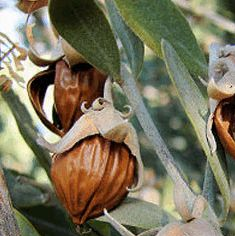
The Jojoba plant grows in hot dry climates. It produces a small bean pod. The beans from the bean pods are heated and a botanical extract is secreted, which we call Jojoba (pronounced ho-ho-ba) oil.
The product of the extraction is not actually oil but is actually a substance called a wax ester. Wax ester is very similar to the oil produced by the human skin (sebum) and is thus non-occlusive (easily absorbed and will not block pores).
Jojoba oil is good for skin elasticity, effective in fighting skin disorders, and relieves skin infections like acne, insect bites, fungal microbes etc., while at the same time moisturizing the skin. Jojoba oil is known to help sensitive skin conditions such as psoriasis and eczema.
7. Geranium (pelargonium odorantissimum)
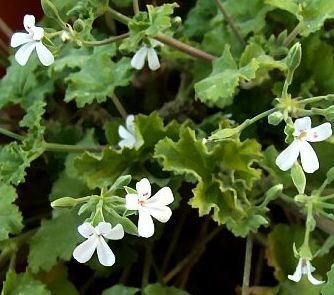
The essential oil is extracted from the plant P. odorantissimum, of the Geraniaceae family, also known as apple geranium.
The oil has a strong floral aroma and a hint of mint, with a slight apple undertone. The leaves and stalks of the plant are used, and the pure oil is obtained through steam distillation.
The therapeutic properties of geranium essential oil include as an astringent, haemostatic and styptic (helps to staunch bleeding), antiseptic, antibiotic, and anti-infectious.
Geranium oil has been used to help in the treatment of the following: acne, bruises, burns, cuts, poor circulation, dermatitis, eczema and is good to relieve fluid retention and help fight cellulite. It works to stabilize and balance the skin’s tone.
8. Calendula (calendula officinalis)

Pot marigold (or Calendula) is a perennial but widely cultivated as an annual herb, and is grown easily in sunny locations in most kinds of soils. The essential oil is obtained from the flowers, through a distillation process.
Plant pharmacological studies suggest that Calendula extracts may have antiseptic, anti-viral, anti-genotoxic and anti-inflammatory properties due to its antioxidant activity and reduction of oxygen radicals.
The plant has many traditional culinary and herbal uses. Historically, Calendula has been used in creams for centuries due to its extraordinary healing, cleansing and antiseptic properties. It is used for soothing and healing skin wounds, also as a remedy for certain digestive disorders.
Calendula has been shown to speed healing of wounds, and the dried petals of the calendula plant are used in tinctures, ointments, and washes for the healing of burns, bruises, and cuts, as well as the minor infections they cause.
9. Organic Beeswax (cera alba)
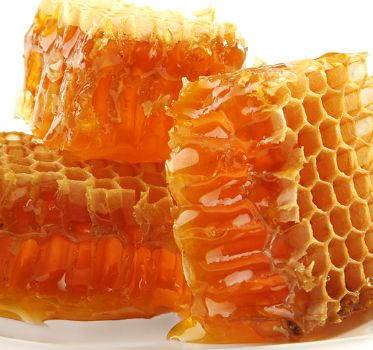
Beeswax is a natural wax produced by worker bees in the bee hive of honey bees. The wax is filtered to be free of debris, but is otherwise used with little or no further processing.
Natural beeswax acts as the perfect natural thickening agent, emulsifier, and humectants for water retention. It contains compounds called wax esters that mimic the oils found in human skin, and remains biologically active even after processing, with proven anti-bacterial properties.
